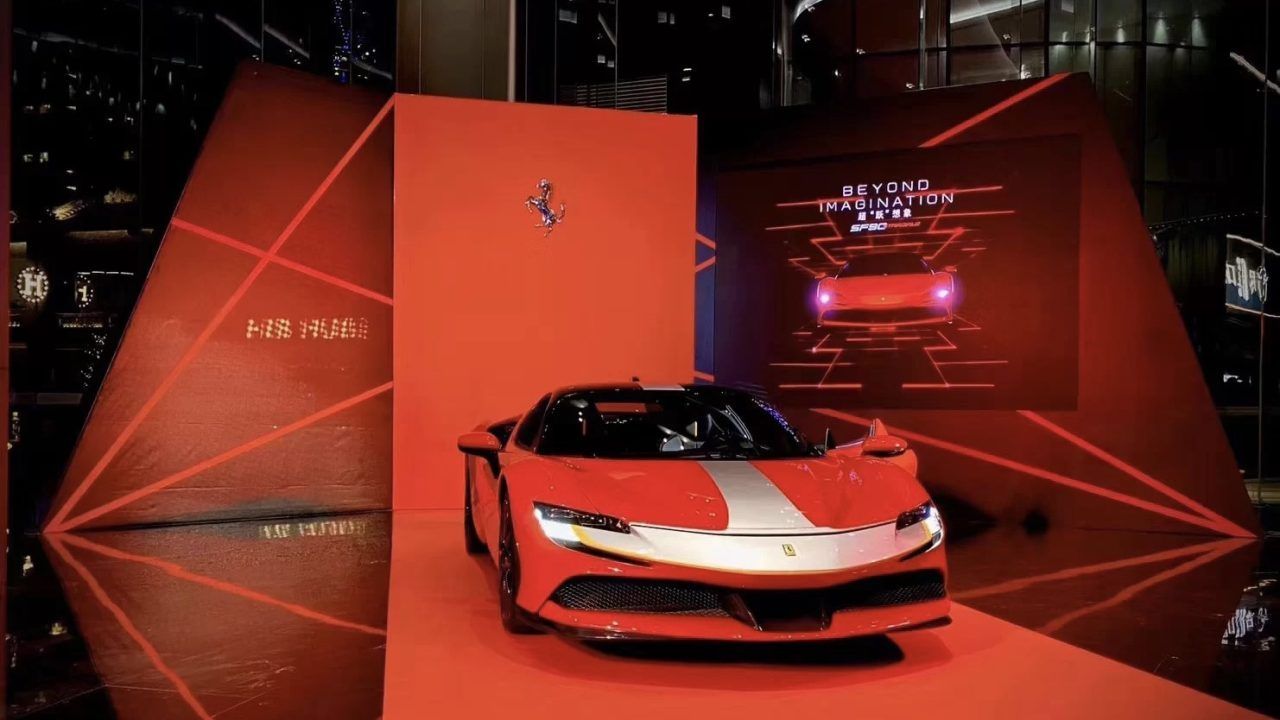Are Luxury Car Brands Losing Ground In China? A Case Study Of BMW And Porsche

Table of Contents
The Rise of Domestic Chinese Luxury Car Brands
The dramatic rise of domestic Chinese luxury car brands is a primary factor impacting international players. This isn't just about increased competition; it's a fundamental reshaping of the market.
Increased Competition from Local Players
The emergence of brands like Nio, Xpeng, and Li Auto has fundamentally altered the playing field. These companies aren't just offering alternatives; they're leveraging technological advancements and competitive pricing to aggressively capture market share.
- Successful Chinese EV Models: Nio's ET7, Xpeng's G9, and Li Auto's L9 represent sophisticated, technologically advanced vehicles, often exceeding expectations in features and performance.
- Feature Comparison: These models frequently boast superior infotainment systems, advanced driver-assistance systems (ADAS), and competitive battery technology, often at a lower price point than comparable BMW and Porsche models.
- Government Support: Significant government support for domestic EV brands through subsidies and infrastructure development further bolsters their competitive advantage.
Shifting Consumer Preferences
Chinese consumer preferences are also evolving rapidly. The demand for technology, electric vehicles (EVs), and personalized features is surging, presenting a significant challenge for established luxury car brands.
- EV Adoption Surge: China leads the world in electric vehicle adoption, with sales consistently exceeding those in other major markets. This rapid shift necessitates a strong EV portfolio.
- Tech-Savvy Consumers: Chinese luxury car buyers are increasingly tech-savvy, demanding seamless connectivity, advanced driver-assistance features, and over-the-air updates.
- Marketing Strategies: Chinese brands are employing sophisticated digital marketing strategies, tailoring their messaging to resonate with the preferences of younger, tech-oriented consumers.
Challenges Faced by BMW and Porsche in China
While BMW and Porsche retain brand prestige, they face significant hurdles in maintaining their positions in the dynamic Chinese market.
Pricing and Market Positioning
Maintaining premium pricing strategies against increasingly competitive domestic brands poses a major challenge.
- Pricing Comparisons: Direct comparisons of similarly sized and featured models often reveal a significant price gap between established brands and their Chinese counterparts.
- Tariffs and Import Duties: Import tariffs and duties on imported vehicles add to the cost, further impacting price competitiveness.
- Pricing Adjustments: BMW and Porsche may need to consider more aggressive pricing strategies or focus on niche markets to remain competitive.
Supply Chain and Production Issues
Global supply chain disruptions and production challenges have also affected the availability of BMW and Porsche vehicles in China.
- Supply Chain Bottlenecks: The impact of semiconductor shortages and other global supply chain issues have led to delays and reduced availability of certain models.
- Mitigation Strategies: Increased local production and strategic partnerships with local suppliers could help mitigate these issues.
- Impact on Customer Satisfaction: Delays and supply shortages can directly impact customer satisfaction and brand loyalty.
Adapting to the Electric Vehicle Revolution
The rapid growth of the EV market in China demands a comprehensive and rapid shift in strategy for luxury brands.
- EV Model Comparison: While both BMW and Porsche offer EVs in China, their portfolios are smaller and, in some cases, less technologically advanced than those of domestic competitors.
- Charging Infrastructure: The availability and reliability of charging infrastructure remain a significant challenge for EV adoption, affecting both consumer confidence and brand perception.
- Technological Advancements: Chinese EV brands are frequently at the forefront of battery technology and autonomous driving features, requiring established brands to accelerate their innovation efforts.
Future Outlook for Luxury Car Brands in China
The future of luxury car brands in China hinges on adaptability and strategic adjustments.
Strategies for Success
For BMW, Porsche, and other international brands to thrive, several key strategies are crucial:
- Adaptive Pricing: More competitive pricing models, possibly including regional variations, may be necessary.
- Enhanced Marketing: Targeted marketing campaigns that resonate with the evolving preferences of Chinese consumers are essential.
- Localized Production: Increased local production capabilities and strengthened partnerships with Chinese suppliers will reduce reliance on global supply chains and improve responsiveness to market demands.
Long-Term Implications
The long-term consequences of a continued decline in market share for international luxury car brands in China could be substantial:
- Global Market Shifts: The Chinese market's influence on global automotive trends is undeniable. A loss of market share in China could significantly impact global brand perception and value.
- Investment Decisions: Future investment strategies and global expansion plans will undoubtedly be influenced by the performance and market share in China.
Conclusion:
The Chinese luxury car market is in the midst of a profound transformation, presenting a significant challenge to established international luxury car brands like BMW and Porsche. While brand heritage and recognition remain valuable assets, the rise of competitive domestic brands, changing consumer preferences, and the rapid expansion of the electric vehicle market demand decisive action. To maintain their competitiveness and market share, BMW, Porsche, and other luxury car brands must prioritize innovation, adapt their pricing and marketing strategies, and strengthen local partnerships and supply chains. Failure to do so could lead to a further decline in market share, underscoring the vital need for a renewed strategic focus on this crucial market. Continued monitoring and analysis of the luxury car market in China are imperative for navigating the complexities of this dynamic landscape.

Featured Posts
-
 Sabadell And Unicaja Examining The Potential For A Banking Merger
May 13, 2025
Sabadell And Unicaja Examining The Potential For A Banking Merger
May 13, 2025 -
 Sabalenka Secures Miami Open Championship 19th Wta Title
May 13, 2025
Sabalenka Secures Miami Open Championship 19th Wta Title
May 13, 2025 -
 David Alan Grier Funeral Home Owner A Closer Look At The Elsbeth Preview
May 13, 2025
David Alan Grier Funeral Home Owner A Closer Look At The Elsbeth Preview
May 13, 2025 -
 Asap Rocky Entangled A Closer Look At The Legal Battles With 50 Cent Tory Lanez And Others
May 13, 2025
Asap Rocky Entangled A Closer Look At The Legal Battles With 50 Cent Tory Lanez And Others
May 13, 2025 -
 Dzherard Btlr Emotsionalna Snimka Posvetena Na Blgariya
May 13, 2025
Dzherard Btlr Emotsionalna Snimka Posvetena Na Blgariya
May 13, 2025
Latest Posts
-
 Is Tommy Fury Copying Molly Mae Hagues Approach To Public Relations
May 14, 2025
Is Tommy Fury Copying Molly Mae Hagues Approach To Public Relations
May 14, 2025 -
 Tommy Furys Revelation Molly Mae Hague Fan Reaction Explodes
May 14, 2025
Tommy Furys Revelation Molly Mae Hague Fan Reaction Explodes
May 14, 2025 -
 Tommy Furys Private Life Announcements A Comparison To Molly Mae Hague
May 14, 2025
Tommy Furys Private Life Announcements A Comparison To Molly Mae Hague
May 14, 2025 -
 Tommy Fury And Molly Mae Did The Tassel Shorts Triumph
May 14, 2025
Tommy Fury And Molly Mae Did The Tassel Shorts Triumph
May 14, 2025 -
 Tommy Fury Mirroring Molly Mae Hagues Private Life Announcements
May 14, 2025
Tommy Fury Mirroring Molly Mae Hagues Private Life Announcements
May 14, 2025
